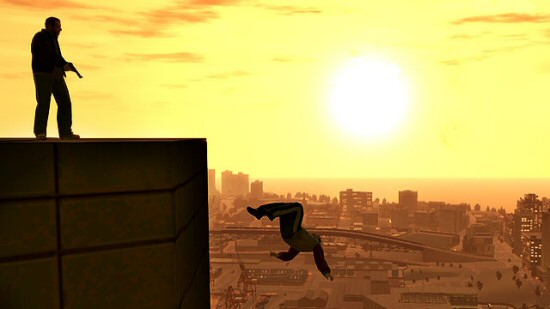Earth to Chicago: Gaming’s “M” is Movies’ “R”
By Jared Newman | Thursday, July 23, 2009 at 7:37 pm
 There’s a storm brewing in the Windy City over the allegedly unconstitutional treatment of video game ads, with an industry trade group suing Chicago’s transit authority.
There’s a storm brewing in the Windy City over the allegedly unconstitutional treatment of video game ads, with an industry trade group suing Chicago’s transit authority.
This turn of events stems from Grand Theft Auto IV. Last year, a rash of shootings led the Chicago Transit Authority to pull GTAIV bus ads, after a local Fox News report drew a tenuous link between the ads and the incidents. GTA Publisher Take-Two Interactive claimed breach of contract, and the transit authority reinstated the ads, but later banned all advertisements for M-rated games. It’s important to note that R-rated movie ads are still allowed.
That brings us to the Entertainment Software Association’s free speech lawsuit, and a question posed by the Christian Science Monitor: “Are ‘mature’ video games worse than rated-R movies?”
No. Let’s put the “games are worse because they’re interactive” argument aside for a moment and look at the ratings themselves. Here’s what the Motion Picture Association of America says about R-rated films:
An R-rated motion picture may include adult themes, adult activity, hard language, intense or persistent violence, sexually-oriented nudity, drug abuse or other elements, so that parents are counseled to take this rating very seriously.
Now, here’s the Entertainment Software Ratings Board on the M rating:
Titles rated M (Mature) have content that may be suitable for persons ages 17 and older. Titles in this category may contain intense violence, blood and gore, sexual content and/or strong language.
Looks pretty similar to me, especially the phrase “intense violence” in both descriptors. If the ratings themselves are so similar, the point of contention will surely be interactivity. But as courts have repeatedly found, it isn’t proven that violent video games cause violence because you play them, while movies don’t because you watch them.
Whether you like violent video games or not, their first-amendment protections should be a no-brainer to anyone who’s even dimly aware of past laws and lawsuits. I can’t see how the Chicago Transit Authority will emerge the victor in this case.
7 Comments
Read more:
3 Comments For This Post
4 Trackbacks For This Post
-
M vs. R: The Game Rating Double Standard| The Game Blog | Daily Fresh News of the Latest Games on Playstation, Xbox, Wii and PC| Coeds.cc Says:
July 24th, 2009 at 3:20 pm[…] the question posed by the Monitor, the Technologizer blog looked at the Entertainment Software Ratings Board’s definition of a “Mature” game and compared it to that of the R rating for the Motion Picture Association of […]
-
M vs. R: The Game Rating Double Standard| Latest breaking News on Video Games Hardware and Software.| BadPower.com Blog Says:
July 24th, 2009 at 3:23 pm[…] the question posed by the Monitor, the Technologizer blog looked at the Entertainment Software Ratings Board’s definition of a “Mature” game and compared it to that of the R rating for the Motion Picture Association of […]
-
M vs. R: The Game Rating Double Standard | GameWitz Says:
July 24th, 2009 at 7:00 pm[…] the question posed by the Monitor, the Technologizer blog looked at the Entertainment Software Ratings Board’s definition of a “Mature” game and compared it to that of the R rating for the Motion Picture Association of […]
-
Gaming Insiders - console games, console movies and trailers, console reviews, cheats and news. Says:
July 24th, 2009 at 10:01 pm[…] the question posed by the Monitor, the Technologizer blog looked at the Entertainment Software Ratings Board’s definition of a “Mature” game and compared it to that of the R rating for the Motion Picture Association of […]













July 24th, 2009 at 7:48 am
Until there is a video game that is about the player actually cutting up, torturing and dismembering an in-game avatar over the course of hours, even the M games won’t be competing with the SAW franchise, or their ilk.
To me these knee-jerk actions by the politicians seem designed to increase lobbying dollars from the gaming industry more than protecting anybody from anything, because they certainly aren’t protecting anyone from anything in movies.
July 24th, 2009 at 10:12 am
Wonder if ads for “The Taking of Pelham 123” are posted on the El trains? That would make ME nervous. 😀
August 18th, 2009 at 8:26 am
And the other ratings for both Games and Music have their respective counterparts:
Early Childhood (EC)= G
E (Everyone)= PG (Most kids films nowadays are rated PG!)
E-10= Somewhere on the border between PG and PG-13
T (Teen)= PG-13
AO (Adults Only)= NC-17